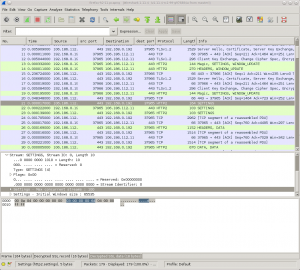 Recently I cloned the Wireshark git repository and started updating the http2 dissector. That’s the piece of code that gets called to analyze a stream of data that Wireshark thinks is http2.
Recently I cloned the Wireshark git repository and started updating the http2 dissector. That’s the piece of code that gets called to analyze a stream of data that Wireshark thinks is http2.
The current http2 dissector was left at draft-09 state, while the current draft at the time was number 11 and there have been several changes on the binary format since so any reasonably updated client or server would send or receive byte streams that Wireshark couldn’t properly display.
I never wrote any dissector code before but I must say Wireshark didn’t disappoint. It was straight forward and mostly downright easy to fix most of the wrong details. I’m not pretending to be a master at this nor is the dissector code anywhere near “finished” yet but I still enjoyed the API and how to write a thing like this.
I’ve since dissected plain-text http2 streams that I’ve done with curl+nghttp2 and I’ve also used the SSLKEYLOGFILE trick with Firefox to automatically decrypt the TLS session and have the dissector figure out the underlying http2 parts.
If there’s any little snag to mention, it is the fact that they insist on getting patches submitted directly to gerrit instead of any mailing list or similar. This required me to create a gerrit account, and really figure out how to push my stuff from git to there, instead of the more traditional and simpler approach of just sending my patch to a mailing list or possibly submitting it to a bug/patch tracker somewhere with my browser.
Call me old-style but in fact the hip way of today with a pull-request github style would also have been much easier. Here’s what my gerrit submission looks like. But I get it, gerrit does push a little more work over to the submitter and I figure that once a submitter such as myself finally has fixed all the nits in the patch it is very easy for the project to actually merge it. I actually got someone else to help me point out how to even find the link to view the code review after the first one was submitted on the site… (when I post this, my patch has not yet been accepted or merged into the wireshark git repo)
Here’s a basic screenshot showing a trace of Firefox requesting https://nghttp2.org using http2. Click it for the full thing.
.. and what happens this morning my time? There’s a brand new http2 draft-12 out with more changes on the on-the-wire format! Well to be honest, that really wasn’t a surprise. I’ll get the new stuff supported too, but I’ll do that in a separate patch as I prefer to hold off until I see a live stream by at least one implementation to test against.

